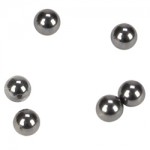Ideal for countless automotive applications, Tungsten Carbides possess unique engineering properties that often outlast tool steel and other wear materials by as much as 10:1. An extremely reliable material that is used for parts that must provide adequate operation when subjected to deflection, deformation, extreme wear, impact, corrosion, heavy loading, and high temperatures.
Tungsten Carbide continues to be utilized in numerous industrial applications including the automotive industry. Tungsten’s high density characteristics also make it suitable as a weight or counterbalance in various machinery applications (airplane flaps, jet engines, mobile phone vibration systems, crankcase balancing weights, automotive parts, golf clubs and as an environmentally acceptable substitute for lead shot in cartridges).
 These attributes make tungsten alloys and recycled carbide suitable for critical temperature-sensitive and wear-resistant machinery components (e.g. engine valves, ball-point pen tips, turbine blades, snow tire studs, and high performance engine parts).
These attributes make tungsten alloys and recycled carbide suitable for critical temperature-sensitive and wear-resistant machinery components (e.g. engine valves, ball-point pen tips, turbine blades, snow tire studs, and high performance engine parts).
Tungsten is a metal with unique properties, not seen in other metals or alloys, making it an essential component in many applications. Typical characteristics include – very high melting point, very high density, hardness close to diamond, thermally and chemically stable, excellent conductor, and being environmentally benign.
Tungsten Carbide and the Automotive Industry
Carbide recyclers are a major provider to manufacturers of Tungsten Carbide scrap. This impressive alloy (mostly mined and exported from China to the USA) has the impressive capability in carbide recycling to produce a product equal to its raw state. Most Tungsten Carbide scrap is combined with a cementing agent which allows for its formation into numerous tools, parts, and applications.
The automotive industry is turning to Tungsten Carbide to produce and deliver high-performance auto parts that can withstand excessive heat and wear. Some parts of an engine sustain massive amounts of heat on a constant basis under driving conditions such as racing. These standard metal parts are known to break, crack, and disintegrate from the stress of use. Replacing standard tooling metal with tungsten carbide can allow for a longer lasting part life, reliability on the track, and less time pulling the vehicle from usage in order to replace the damaged part.
 Carbide recycling is a large industry now that is keeping our Tungsten Carbide resources within the country and reducing our reliance on continual importation of raw material. Current scrap carbide pricing encourages machine tooling shops, industrial operations, construction, aviation, farming, and automotive industry entities to practice carbide recycling. There is a significant return on investment when exchanging scrap carbide (sludge, dust, parts, broken pieces, mill ends and tips) for compensation from a scrap carbide recycler.
Carbide recycling is a large industry now that is keeping our Tungsten Carbide resources within the country and reducing our reliance on continual importation of raw material. Current scrap carbide pricing encourages machine tooling shops, industrial operations, construction, aviation, farming, and automotive industry entities to practice carbide recycling. There is a significant return on investment when exchanging scrap carbide (sludge, dust, parts, broken pieces, mill ends and tips) for compensation from a scrap carbide recycler.
Scrap Carbide Recycling
Standard metal recycling businesses are generally not prepared to offer current scrap carbide pricing and may not be fully up-to-date on the proper method to recycle. Always use a well-known carbide recycler such as Carbide-USA to obtain the best pricing and appropriate methods for storage and delivery to their facility.
Current scrap carbide pricing can fluctuate on a daily basis, but still provides the best ROI on your scrap carbide. Carbide-USA is a nationally known carbide recycler with extensive experience and professionalism.
Tungsten Carbide is one of our most valuable resources that withstands the hard wear and tear associated with many of our industrial applications. The automotive industry is truly finding that replacing hardened steel with Tungsten Carbide reduces the future repairs, prolongs usage, and withstands some of the extreme heat and friction experienced in high-performance vehicles.

